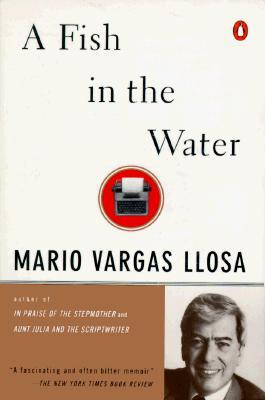Mario Vargas Llosa, the winner of the 1991 T.S. Eliot Award for Creative Writing, has fashioned a provocative symmetry in this memoir. He writes of growing up in Peru and Bolivia, bringing his life up to the point where he leaves for Europe at age 22, all the while alternating chapters that cover his candidacy for president of Peru in 1990. Those chapters of Bildungsroman or Künstlerroman offer us intimate scenes of family life, albeit sometimes a tortured one, and, concurrently, a slice of Peruvian social and political life, in Arequipa and Lima. Abandoned by his father before he was born, Vargas Llosa grew up among his mother’s family, with a grandfather and lots of uncles and aunts. He grew up that way until his father, whom he had been told “was in heaven,” showed up when the boy was about 11 or 12.
He attributes his father’s rage at his mother’s family to a feeling of social inferiority. Even though his father was white and blue eyed, his family had fallen economically to the point where better- off whites, or “blancos,” thought of the fallen ones as “cholos,” or halfbreeds of mixed Spanish and Indian blood. In other scenes we read of the children abandoned by servants and reared by his grandfather’s family. Such evocations of Peru’s parti-colored society find resonance in the chapters about the presidential campaign, in which one of the issues for some voters in regard to Alberto Fujimori—who subsequently won the election—was the fact that he was born of Japanese parents and “had none of his people yet buried in Peru.”
Other such resonances occur. For example, Vargas Llosa writes of his Marxist phase, which seems to be an unfortunate rite of passage for many young Latin Americans. The underground Communist Party made its secretive appearance under the name “Cahuide,” and he, a student at the University of San Carlos, became a sympathizer, attended the requisite secret meetings, and was given the name “Comrade Alberto.” He drifted away from the Cahuide, the departure coincident with one of his cellmates falling in bourgeois love with a cellmate whom the author had secret feelings about. Besides giving us a look into the machinations of college-level, Latin Marxism, this section of the narrative familiarizes the reader with some of the political parties in Peru that come to bear on the 1992 election: APRA (American Popular Revolutionary Alliance), UR (Revolutionary Union), the lU (United Left), which was a combine of socialists and communists, and, not incidentally, Sendero Luminoso (Shining Path).
A minor confusion I had was over Vargas’s opposition to “mercantilist capitalism,” when he seems to be such a champion of free enterprise. My initial response was, “What other kind is there?” In other readings, I discovered the term has a technical meaning for economists. At one point he describes the “daily bread of mercantilism: import licenses, tax exemptions, concessions, monopolies, commissions, that entire discriminatory framework that keep an economy that is under government control functioning.” To me, that sounds like what businessmen have to go through when a government attempts to regulate everything, and not particularly the fault of “capitalism”; but at the same time, this description of what businessmen in Peru have to face is uncomfortably suggestive of the contortions American businessmen have to go through at all levels of government.
What will interest Chronicles readers especially are parts of Vargas’s economic program for Peru. It should be remembered that what started the novelist on his candidacy for president was then-President Alan Garcia’s announcement that he was going to nationalize the banks of the country. The subsequent demonstrations led by Vargas stopped that effort in its tracks. He describes the themes of his early speeches in the campaign:
The way out of poverty does not lie in redistributing the little wealth that exists but in creating more. And in order to do that markets must be opened up, competition and individual initiative encouraged, private property not be fought against but extended to the greatest number, our economy and our psychology taken out of the grip of the state, and the handout mentality that expects everything from the state replaced by a modern outlook that entrusts the responsibility for economic life to civil society and the market.
Later he was to use figures that demonstrated that if all the assets of the hundred biggest corporations in Peru were divided up, each citizen would get $56.
In another place Vargas observes that the economic policies that do work are:
the ones which, since they take into account an inevitable inequality between those who produce more and those who produce less, lack the intellectual and ethical fascination that has always surrounded socialism, and have been condemned because they encourage the profit motive. But egalitarian-oriented economies based on solidarity have never raised a country out of poverty; they have impoverished it even further. And they have frequently limited freedoms or caused them to disappear altogether, since egalitarianism requires strict planning, which starts out by being economic and gradually spreads to the rest of life.
While for many of us the recounting of recent Peruvian political history is fascinating enough, for others the story reminds us of the peril we ourselves face at this time in American history. Once in place, statism—the policy of concentrating economic and political controls in the state at the cost of individual liberty—is immensely difficult to dislodge, short of revolution or a tedious suicide.
[A Fish in the Water, by Mario Vargas Llosa (New York: Farrar, Straus & Giroux) 532 pp., $25.00]

Leave a Reply